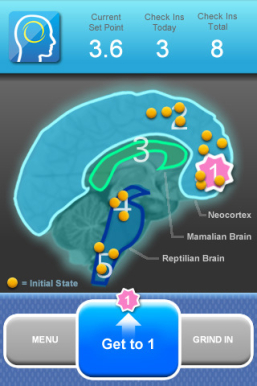 Emotions play a key and often dominate role in our brain function and cognitive performance. We create emotions anytime we appraise or make judgments on people, events, ideas or other things. Our ability to spot, understand and manage emotions in ourselves and others correlates more strongly to life success than IQ. So-called emotional intelligence is a cornerstone for high performance learning, decision-making, creativity, collaboration and other mental and social processes. So I am also on the lookout for new science-based techniques for training my emotional brain.
Emotions play a key and often dominate role in our brain function and cognitive performance. We create emotions anytime we appraise or make judgments on people, events, ideas or other things. Our ability to spot, understand and manage emotions in ourselves and others correlates more strongly to life success than IQ. So-called emotional intelligence is a cornerstone for high performance learning, decision-making, creativity, collaboration and other mental and social processes. So I am also on the lookout for new science-based techniques for training my emotional brain.
For example, take the work on Emotional Brain Training or EBT. It provides a simple way to assess which of five core brain states you are in and then suggests a tool for achieving self-regulation . The five brain states and associated tools are related to your level of stress and include:
- Balanced/reward (joy) state use the Sanctuary tool
- Balanced state use the Feelings check tool
- Verge of stress (mixed) state use the Emotional Housecleaning tool
- Stressed (unbalanced) state use the Cycle tool
- Full blown stress (underwhelmed) state use the Damage control tool
To get started right away you can download the Emotional Brain Training iPhone app (shown above) or find the equivalent in the Droid market.
 If you want to understand more of the theory behind how it works check out the new book, Wired for Joy. Or consider some of the training and coaching offerings from the Institute for Health Solutions.
If you want to understand more of the theory behind how it works check out the new book, Wired for Joy. Or consider some of the training and coaching offerings from the Institute for Health Solutions.
I am just learning to use EBT and am interested to hear from readers that have some experience with one or more of the five tools.
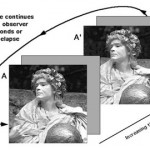 Found an interesting cognitive neuroscience demonstration on Go Cognitive designed to let you test yourself in the change-blindness paradigm. Change blindness involves making significant changes in a visual scene that go unnoticed.
Found an interesting cognitive neuroscience demonstration on Go Cognitive designed to let you test yourself in the change-blindness paradigm. Change blindness involves making significant changes in a visual scene that go unnoticed.
The demo is fun, gives you a number of scenes to work with and lets you control some key parameters. Experiment a bit, especially with the strategy you use to detect changes. Try defocussing your eyes and looking at the images globally to detect a difference and then try systematically comparing the images item by item. Which gives you a better score?
Categories:
Perception, Software Tags:
 There are two kinds of mindless reading. The first kind, often associated with guilty pleasure, involves reading something just for fun. There is no expectation that you will learn or grow. A trashy novel is a good example. The second kind of mindless reading involves moving your eyes across and down a page while you are thinking about something else or otherwise not paying attention. You are not being mindful of the written word. Re-reading the same paragraph over and over or getting to the bottom of a page and not remembering a single word are typical examples.
There are two kinds of mindless reading. The first kind, often associated with guilty pleasure, involves reading something just for fun. There is no expectation that you will learn or grow. A trashy novel is a good example. The second kind of mindless reading involves moving your eyes across and down a page while you are thinking about something else or otherwise not paying attention. You are not being mindful of the written word. Re-reading the same paragraph over and over or getting to the bottom of a page and not remembering a single word are typical examples.
According to researchers we often zone out, even when we are trying to read for understanding or receive prompts to pay attention. This suggests:
For those interested in improving cognitive performance, mindless reading presents a major opportunity.
But how can we keep from reading mindlessly when we don’t want to? I’ve spent sometime researching that question and have come up empty. Despite its prevalence there has been very little scientific research done on mindless reading. What has been done shows that it lowers the cognitive performance of reading and lowers test scores.
 In studies subjects that experience mindless reading have reported being distracted by hunger, thirst, sleepiness, boredom and sexual desire. Making sure you are rested, well fed and the rest to avoid mindless reading makes good common sense. But what else can be done?
In studies subjects that experience mindless reading have reported being distracted by hunger, thirst, sleepiness, boredom and sexual desire. Making sure you are rested, well fed and the rest to avoid mindless reading makes good common sense. But what else can be done?
Very interested to hear from readers about specific techniques for decreasing the frequency of unwanted mindless reading.
 In an earlier post I reported on research that demonstrated dreaming can improve your ability to solve a maze navigation task by a factor of 10. Since then I’ve been on the look out for science-based advice on how you can tune your approach to sleeping to solve problems, accelerate learning and improve creativity.
In an earlier post I reported on research that demonstrated dreaming can improve your ability to solve a maze navigation task by a factor of 10. Since then I’ve been on the look out for science-based advice on how you can tune your approach to sleeping to solve problems, accelerate learning and improve creativity.
The Scientific American just published a story, How Can You Control Your Dreams? that provides very specific advice. Here is a summary of how to problem solve in a dream:
- You must actually dream about it not just sleep on it
- Problems with a visual representation or solution and those that really require thinking outside the box (defy convention wisdom) yield best to dreaming.
- Prime yourself by thinking about the problem before you sleep. If possible hold an image of it in your head.
- If possible, include a diagram, instrument, sheet of music or whatever other artifacts are associated with your work with the problem near your bedside. Nothing mystical here is just deepens the priming effect.
- Wake up slowly, lying in bed and replay or savor your dream. You may only have fragments but focus on emotions you feel and the rest should follow. This is critical. The solution or partial solution may become evident just as you are waking.
If this method is going to work for you it should do so quickly. Try it for a couple of weeks.
The article goes on to discuss techniques for how to dream about specific people, escape nightmares and engage in lucid dreaming or being aware you are dreaming while you are dreaming.
Very interested to hear from readers that use the dreaming mind to improve brain function and enhance cognitive performance.
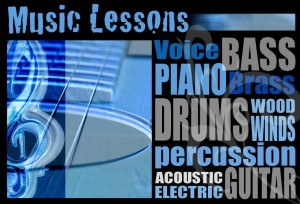 New research from Northwestern University, Taking Music Seriously, confirms that learning to play a musical instrument is a powerful way to improve general brain function and cognitive performance. To quote:
New research from Northwestern University, Taking Music Seriously, confirms that learning to play a musical instrument is a powerful way to improve general brain function and cognitive performance. To quote:
“Now a data-driven review by Northwestern University researchers that will be published July 20 in Nature Reviews Neuroscience pulls together converging research from the scientific literature linking musical training to learning that spills over to skills including language, speech, memory, attention and even vocal emotion. The science covered comes from labs all over the world, from scientists of varying scientific philosophies, using a wide range of research methods.”
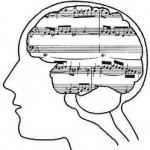 It seems musical training enhances neuroplasticity and primes the brain for improved performance in a variety of communication and learning tasks. These appear to be life-long and life-wide (outside the context of music) effects.
It seems musical training enhances neuroplasticity and primes the brain for improved performance in a variety of communication and learning tasks. These appear to be life-long and life-wide (outside the context of music) effects.
Interested to hear from readers that use musical training for brain fitness and and cognitive enhancement.
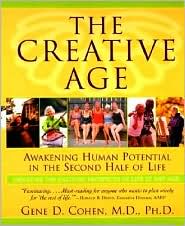 The theme behind this blog is that nature gave us the hind brain, mid brain and fore brain, now the Next Brain is up to us. A somewhat playful way of making the claim that we now have enough science, technology and practical insight to implement training programs and lifestyle changes that will significantly impact brain function and cognitive performance. The 80+ posts on this site are just scratching the surface.
The theme behind this blog is that nature gave us the hind brain, mid brain and fore brain, now the Next Brain is up to us. A somewhat playful way of making the claim that we now have enough science, technology and practical insight to implement training programs and lifestyle changes that will significantly impact brain function and cognitive performance. The 80+ posts on this site are just scratching the surface.
One of the most exciting trends that support the prospects of your Next Brain is the recent scientific work suggesting many important cognitive functions actually improve with age. Indeed, there maybe several stages of cognitive development that move us through adulthood and old age. I have blogged on this before but want to encourage you to read Cohen’s book, The Creative Age. It is inspirational at many levels but one of the things that is particularly striking are the examples he gives of major creative contributions made by older adults.
Some examples:
- Freud publishes the Ego and the Id (his major work) at 67
- Stradivaria (or Stradivarious) designed and built his two most famous violins – the Habeneck and the Muntz when he was 92
- Leaky made her most important archeological discovery (hominid footprints that are 3.5 million years old) when she was 65
- Alexanderson was award a patent on the color television reciever developed for RCA when he was 77
- A 65 year old physicist was the first to liquify helium in 1932
- Michelangelo was 72 when he was appointed architect for St. Peters in Rome
These examples are important because they demonstrate creative acts of global importance started and completed by older adults. This is very different from the many examples of older adults that are recognized for creative acts completed during younger years.
Now most of us are not world-class scientists, artisians, inventors or leaders but the message from these examples is still very relevant:
It is possible to continue to develop and use advanced cognitive skills as we age into our 60s, 70s, 80s and even 90s.
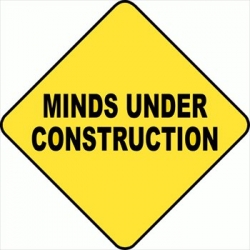 This challenges one of the major myths about the aging brain that shrinks, becomes forgetful, cannot grow new brain cells/connections, loses energy and in more and more cases slides into dementia. Clearly our minds are still under construction.
This challenges one of the major myths about the aging brain that shrinks, becomes forgetful, cannot grow new brain cells/connections, loses energy and in more and more cases slides into dementia. Clearly our minds are still under construction.
Perhaps we will ultimately learn that the decades of later adulthood and old age are in fact just the time and proving grounds we need to build our Next Brains.
 The PsyBlog recently published a couple of posts outlining 14 techniques with supporting psychological research for being more creative. The posts are:
The PsyBlog recently published a couple of posts outlining 14 techniques with supporting psychological research for being more creative. The posts are:
I won’t repeat the techniques here as they are described and referenced well in the posts. They are worth a read and some experimentation.
I guarantee you will find at least 2 or 3 techniques you have not tried before.
Interested to hear from readers on specific techniques for boosting creativity.

The Next Brain Blog is dedicated to exploring the techniques, materials and lifestyle choices that lead to improved brain function and peak cognitive performance. Much of what you will find on this blog produces incremental effects. The idea is to combine many of them into a program and reap the rewards over the longer term. That is the way it works with physical exercise and indeed with most things in life. But this need not be as boring as it sounds.
A longterm tightly-focused cognitive training program can produce extreme and even profound results in ordinary people.
Take for example, the case recently reported in the Research Blog about a 58 year old man, JB, that was able to memorize and recite (under controlled conditions) the entirety of Milton’s Paradise Lost. That is a 10,565 line 60,000 word epic poem. It took him nine years.
“Just how did JB manage to pull off this incredible feat? He studied for about one hour per day, reciting verses in seven-line chunks, consistent with Miller’s magic number seven – the capacity of short-term, working memory. Added together, JB estimates that he devoted between 3000 to 4000 hours to learning the poem. Seamon’s team interpret this commitment in terms of Ericsson’s ‘deliberate practice theory’, in which thousands of hours of perfectionist, self-critical practice are required to achieve true expertise.”
And his performance was far find mindless memorization. It involved “deep cognitive involvement” with the material.
One hour a day for nine years. A lot of training but doable. You may not be interested in memorizing a book but that’s not the point. JB’s work demonstrates that we can achieve extreme mental performance if we are willing to put in the work. A general claim is that with the right training you can achieve world-class performance in 10 years or 10,000 hours in any domain. It is not talent that wins but dedication, proper training and time. Looks like this might hold for cognitive performances as well.
Very interested to hear from readers that are considering or engaged in a longterm tightly-focused cognitive training program.
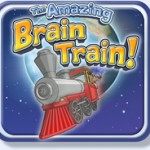 A playful way to do a little brain training using games: “Fueled by your mental energy, Professor Fizzwizzle’s Brain Train will take you on a brain-boosting adventure!
A playful way to do a little brain training using games: “Fueled by your mental energy, Professor Fizzwizzle’s Brain Train will take you on a brain-boosting adventure!
Put your mighty mind to the test and see how far you can go!”
15 online games for training your brain in planning, memory, spatial reasoning and numbers all for $6.99 or free for 24-hours. For a quick look check out this video.
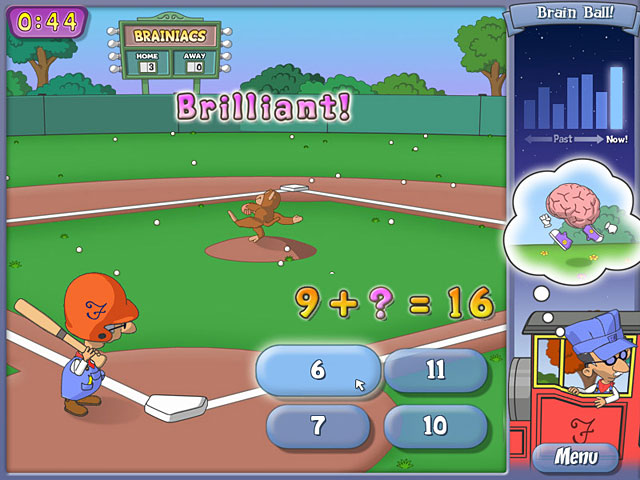
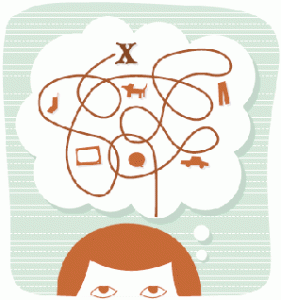 About a third of the time we are awake our mind is wandering. We are not focused on the topic at hand, we are zoning out. Not really in a full day dream just having thoughts unrelated to the tasks we are trying to do. We slip in and out of focus rapidly and often. It is worse if we are drinking or are having a craving.
About a third of the time we are awake our mind is wandering. We are not focused on the topic at hand, we are zoning out. Not really in a full day dream just having thoughts unrelated to the tasks we are trying to do. We slip in and out of focus rapidly and often. It is worse if we are drinking or are having a craving.
For those interested in improving cognitive performance and brain function it seems that mind wandering presents a major opportunity.
Even 10% less wandering during the day would mean 30 minutes or so more mental time on task! This puts a premium on using techniques, such as mindfulness, that naturally nudge the wandering mind back on task.
 Unfortunately the case is not that clear. There has been research that suggests a wandering mind is critical to enhance creativity. More recent research even suggests it may improve decision-making. Point being that our mind likely wanders for a reason and that reason is likely essential for high performance.
Unfortunately the case is not that clear. There has been research that suggests a wandering mind is critical to enhance creativity. More recent research even suggests it may improve decision-making. Point being that our mind likely wanders for a reason and that reason is likely essential for high performance.
For a good (and short) article on this topic check out Discovering the Virtues of the Wandering Mind. Interested to hear from readers on their view. Especially interested in any techniques for minimizing it or getting better cognitive performance from it.
 Emotions play a key and often dominate role in our brain function and cognitive performance. We create emotions anytime we appraise or make judgments on people, events, ideas or other things. Our ability to spot, understand and manage emotions in ourselves and others correlates more strongly to life success than IQ. So-called emotional intelligence is a cornerstone for high performance learning, decision-making, creativity, collaboration and other mental and social processes. So I am also on the lookout for new science-based techniques for training my emotional brain.
Emotions play a key and often dominate role in our brain function and cognitive performance. We create emotions anytime we appraise or make judgments on people, events, ideas or other things. Our ability to spot, understand and manage emotions in ourselves and others correlates more strongly to life success than IQ. So-called emotional intelligence is a cornerstone for high performance learning, decision-making, creativity, collaboration and other mental and social processes. So I am also on the lookout for new science-based techniques for training my emotional brain. If you want to understand more of the theory behind how it works check out the new book, Wired for Joy. Or consider some of the training and coaching offerings from the Institute for Health Solutions.
If you want to understand more of the theory behind how it works check out the new book, Wired for Joy. Or consider some of the training and coaching offerings from the Institute for Health Solutions.













